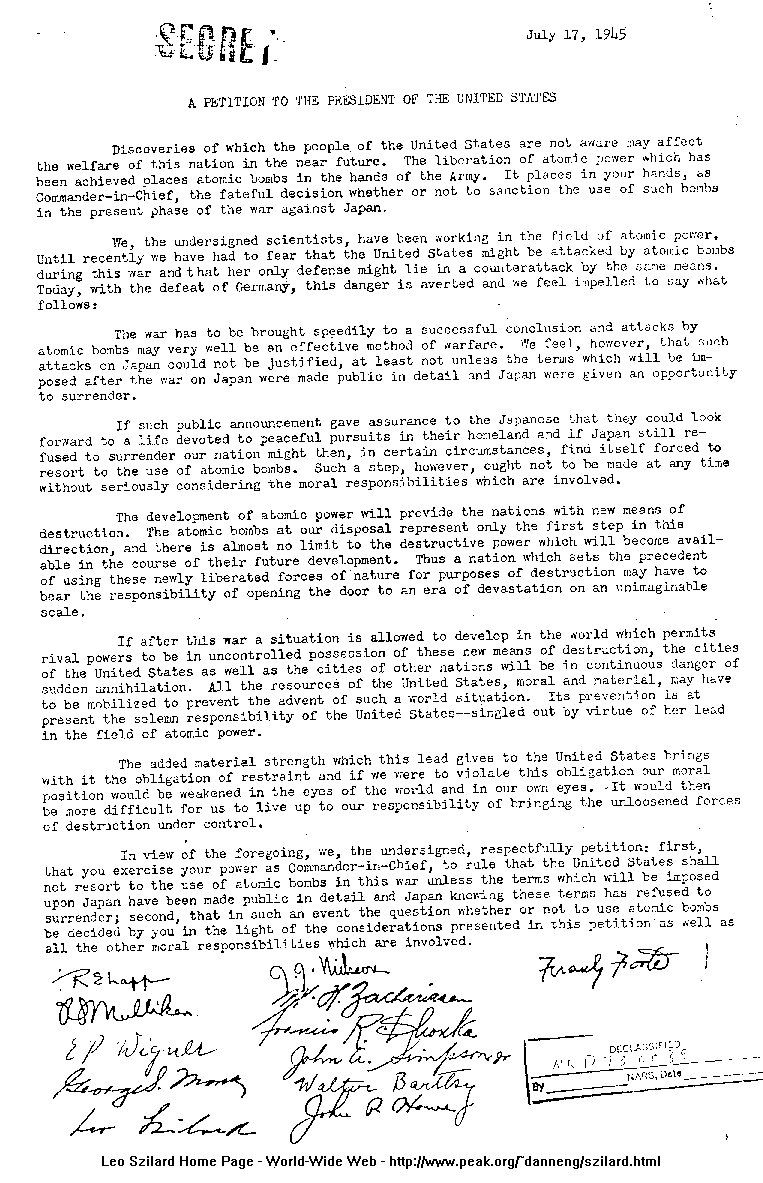
A Petition to the President of the United States
This is an image of Szilard's historic petition,
scanned from a copy of the original in the U.S. National Archives. The
remainder of the 70
signatures appeared on additional pages, which
are not included here. A text version of the petition, including the names
of all signers, is
available below.

Source: U.S. National Archives, Record Group 77, Records
of the Chief of Engineers, Manhattan Engineer District, Harrison-Bundy
File, folder #76.
A PETITION TO THE PRESIDENT OF THE UNITED STATES
We, the undersigned scientists, have been working in the field of atomic
power. Until recently, we have had to fear that the United States might
be attacked by
atomic bombs during this war and that her only defense might lie in
a counterattack by the same means. Today, with the defeat of Germany, this
danger is averted
and we feel impelled to say what follows:
The war has to be brought speedily to a successful conclusion and attacks
by atomic bombs may very well be an effective method of warfare. We feel,
however,
that such attacks on Japan could not be justified, at least not unless
the terms which will be imposed after the war on Japan were made public
in detail and Japan
were given an opportunity to surrender.
If such public announcement gave assurance to the Japanese that they
could look forward to a life devoted to peaceful pursuits in their homeland
and if Japan still
refused to surrender our nation might then, in certain circumstances,
find itself forced to resort to the use of atomic bombs. Such a step, however,
ought not to be
made at any time without seriously considering the moral responsibilities
which are involved.
The development of atomic power will provide the nations with new means
of destruction. The atomic bombs at our disposal represent only the first
step in this
direction, and there is almost no limit to the destructive power which
will become available in the course of their future development. Thus a
nation which sets the
precedent of using these newly liberated forces of nature for purposes
of destruction may have to bear the responsibility of opening the door
to an era of devastation
on an unimaginable scale.
If after this war a situation is allowed to develop in the world which
permits rival powers to be in uncontrolled possession of these new means
of destruction, the
cities of the United States as well as the cities of other nations
will be in continuous danger of sudden annihilation. All the resources
of the United States, moral and
material, may have to be mobilized to prevent the advent of such a
world situation. Its prevention is at present the solemn responsibility
of the United States --
singled out by virtue of her lead in the field of atomic power.
The added material strength which this lead gives to the United States
brings with it the obligation of restraint and if we were to violate this
obligation our moral
position would be weakened in the eyes of the world and in our own
eyes. It would then be more difficult for us to live up to our responsibility
of bringing the
unloosened forces of destruction under control.
In view of the foregoing, we, the undersigned, respectfully petition:
first, that you exercise your power as Commander-in-Chief, to rule that
the United States shall not
resort to the use of atomic bombs in this war unless the terms which
will be imposed upon Japan have been made public in detail and Japan knowing
these terms has
refused to surrender; second, that in such an event the question whether
or not to use atomic bombs be decided by you in light of the considerations
presented in this
petition as well as all the other moral responsibilities which are
involved.
Source note: The position identifications
for the signers are based on two undated lists, both titled "July 17, 1945,"
in the same file as the petition in the
National Archives. From internal evidence,
one probably was prepared in late 1945 and the other in late 1946. Signers
were categorized as either
"Important" or "Not Important," and dates
of termination from project employment were listed in many cases. It is
reasonable to conclude that the lists
were prepared and used for the purpose of
administrative retaliation against the petition signers.